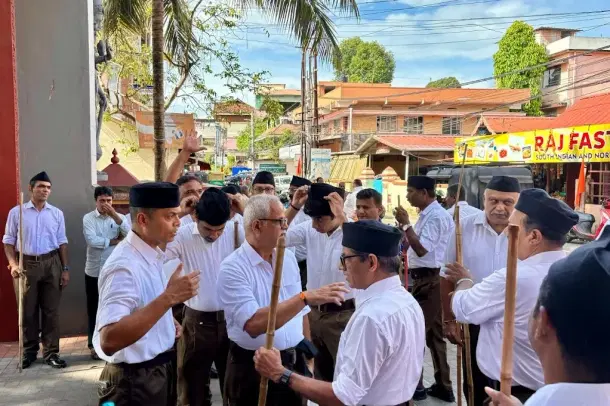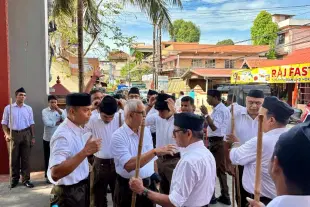Commentary
Abhi Kaam Baaki Hai: A Century Of The Sangh, One Step At A Time
Venu Gopal Narayanan
Oct 03, 2025, 12:10 PM | Updated 12:10 PM IST
Save & read from anywhere!
Bookmark stories for easy access on any device or the Swarajya app.


The men started collecting by the temple gates shortly before the stroke of three. A merciless afternoon sun beat its heat off the pavement into their uniforms. It mattered not a fig to them, the chuckling band over there, the stoic loner here, or the youngsters in charge, who bustled about distributing the one item which was in short supply, the danda, or staff.
Hardly anyone looked unkempt or shabby. Crisp, white full shirts rolled up to an inch above the elbow, neatly pressed brown pants, polished black shoes, and black peaked caps. The name of their town did not matter since the scene was the same everywhere, be it Surat, Sibsagar, Sahranpur or Salem. A gathering of the brotherhood was on.
Many swayamsevaks sported on their wrists, starburst-bright marigold florettes made of saffron thread. Each strand, on its own, as delicate as dharma, but once bound, then as mighty as karma. No fuss, no tomfoolery, just a measured, practised movement of men as they got their shakha ready, to usher in the Rashtriya Swayamsevak Sangh’s (RSS) centenary year this Vijayadashami.
Word had gone out to the rank and file well before their head, Sarsanghachalak Mohan Bhagwat, made his annual Dussehra address earlier that morning. In the coming year, there would be no celebrations, and only service. The message was crisp and clear: centenaries could come and go as they pleased, but they had nothing to do with the Sangh’s primary goal, the reinstitution of dharma across our sacred land.
This was a reiteration of the same humility with which the Sangh was formed in 1925 by Dr Keshav Baliram Hedgewar, and a stern warning to avoid any organisation’s greatest threat, hubris. And, in fact, there is nothing to celebrate, because there is so much work left to be done. ‘Abhi kaam baaki hai’ (the work still remains) could very well be the Sangh’s tagline for the next one hundred years.
Indeed, the work of many generations remains to be taken up. It is how the Sangh has operated from its inception, taking baby steps, on the ground, intensely rooted in the remarkably diverse sensitivities, sensibilities, and needs of a particular locality. This is also how the Sangh has managed to survive the countless threats it has continuously faced (and still faces), from governments, ideologies, divergences within, and great changes without, while slowly growing all the time.
If one approach to solving one problem does not succeed, then try another, and again, and again, but keep trying, always keep trying. Never give up. Never say die. You cannot but marvel at the consistent, unfaltering perseverance which has kept this spirit alive. And you can see it in action in the little things: four aged swayamsevaks with dodgy knees hobbling about as the unit prepares to set off on its route march in the sweltering sun, or in the hunt for a cap for a teenager who is missing one.
You see it along the way, as the unit marches crisply to the parade ground. Women lighting lamps on the street as the contingent passes by their homes. Girls showering the unit with flower petals. People standing with palms folded, eyes closed, praying for these protectors of dharma. Those who know, know; they need no explanation; and to those who do not, none is possible.
Bharatiya Mazdoor Sangh, the Sangh’s trade union affiliate, is the largest in India. Seva Bharathi, its social service affiliate, is the largest such organised volunteer force in the country. The Sangh’s political affiliate, the Bharatiya Janata Party (BJP), has, in time, comprehensively and irreversibly replaced the Congress Party as the principal electoral force in the country.
In the process, over the past century, the Sangh has gradually evolved into a pan-national rajpurohit (for want of a better word), offering pragmatic, practical, morally sound perspectives on various issues. Their recent call for families to have three children, as a long-term mitigative solution to the perils of an ageing population, is but one example of the foresight it employs in its thinking.
But for every person who is a swayamsevak, and for every person who has benefited from the Sangh’s service, there remain twice as many who are still entirely ignorant of the fact that they too are legatees of this land’s ancient traditions and ethos. Many stand antagonistically opposed to the Sangh’s goals for reasons which beggar logic. No matter. A true civilisational awakening may be brought to pass only when they too are brought into the fold. No one can be left behind.
Seen that way, it is but logical to conclude that after a century of toil by millions of Sangh workers, merely a beginning has been made. The real work begins now. Be it a return of traditional family values to counter the deleterious impact of nuclear families in often lonely urban settings, or battling the ecological damage that has been done to nature by forcing a mindset change in every home and office through its ‘Harit Ghar’ programme, the approach is to reach out to every door, one street at a time. That takes time and effort, both of which the Sangh has in spades.
At the same time, in the coming century, the Sangh’s role will also evolve further, as is only natural with changing times, as India begins to emerge as a Vishwaguru, a conscience-keeper for international affairs. That may be a truly clichéd phrase, but it is also the unavoidable reality of tomorrow.
This creeping but inexorable incrementalism, a persistent, unchanging hallmark of how the Sangh has functioned from its founding, may seem frustratingly slow to many. Yet there is no viable alternate path available to such a varied country, if indeed we are to finally cast off the ills of centuries past, and exit the Colonial Age once and for all.
That is why it will still be baby steps for the foreseeable future, as the Sangh continues about its ways, re-instilling the virtues of dharma by touching one soul after another, one toe at a time. It is an imperative, not an option, since only thus, and then, may we fully reclaim our way of life.
Venu Gopal Narayanan is an independent upstream petroleum consultant who focuses on energy, geopolitics, current affairs and electoral arithmetic. He tweets at @ideorogue.





